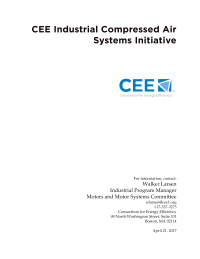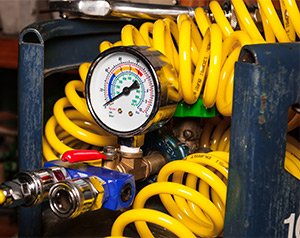

MAY 3, 2017

Boston, MA—Compressed air, so essential to industry that it is often called the “fourth utility,” is also a significant potential source of energy savings. UNIDO estimates that annual cost-effective compressed air savings in the United States and Canada could be over 41,000 GWh, equal to four percent of total annual industrial energy use in the United States and three percent of total annual industrial electricity use in Canada.
Despite their potential, however, these savings have often gone unclaimed. Compressed air systems are so complex and vary so widely that savings opportunities are usually discovered by auditing each individual system, a process often performed by third-party vendors with varying expertise and experience in data collection. This inconsistency in audit comprehensiveness and quality, in turn, makes it difficult for efficiency program administrators to create programs to encourage efficiency in compressed air systems.
In 2013, Consortium for Energy Efficiency (CEE) member program administrators and industry partners met at the CEE Industry Partners Meeting to discuss barriers to improved energy efficiency in compressed air systems.
The group consensus was that inconsistent compressed air system audits made it difficult for program administrators to arrange support for compressed air efficiency measures. Industry members agreed that it would be helpful to the market for audit services and efficiency projects if program administrators defined what they were looking for from a compressed air system audit. The industry could then work to support the common audit requirements. Drawing on this insight, CEE members went to work determining program administrator priorities for compressed air system audits. After substantial discussion and supportive industry feedback, the CEE℠ Industrial Compressed Air Systems Initiative and CEE Audit Specification were launched on January 17, 2017.

The Initiative and Audit Specification set out program administrator priorities for minimum data collection and reporting for compressed air system audits and define audit tiers corresponding to the amount of detail gathered. Each tier takes a holistic approach, specifying that auditors examine the demand side of compressed air systems as well as the supply side in order to discover all available energy efficiency opportunities. The CEE Audit Specification, which provides detailed guidelines for data collection at each audit tier, both serves as a tool for auditors and offers a clear definition of the minimum levels of data program administrators have determined they require in order to offer support for compressed air efficiency projects.
As the market responds to the CEE Initiative, CEE will continue to support efficiency program administrators and industry partners in achieving energy savings in compressed air systems. In an annual Compressed Air Program Summary, planned to start in 2017, CEE will collect and share member data that provide a broad view of program support for compressed air system energy efficiency programs, as well as adoption of the CEE Audit Specification. CEE will also collect representative compressed air system audits from participating members and analyze them against pre-Initiative audits, tracking the changing scope of audits over time.
As members adopt the CEE Initiative and facilities request compressed air system audits that meet the CEE Specification, the identified system energy savings opportunities will be supported by accurate, comparable, and trustworthy data. These data will help program administrators design programs to support energy efficiency in compressed air systems, encouraging even more facilities to seek holistic audits of their systems. As the interests of program administrator and industry members align to discover and pursue the full range of efficiency opportunities in compressed air systems, the considerable energy savings these systems offer may finally come within reach.
About CEE
CEE is an award-winning consortium of efficiency program administrators from the United States and Canada. Members work to unify program approaches across jurisdictions to increase the success of efficiency in markets. By joining forces at CEE, individual electric and gas efficiency programs are able to partner not only with each other, but also with other industries, trade associations, and government agencies. Working together, administrators leverage the effect of their ratepayer funding, exchange information on successful practices and, by doing so, achieve greater energy efficiency for the public good.